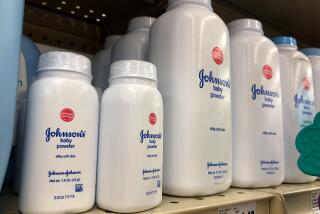Applied Medical Wins $20 Million in Patent Case
- Share via
An Orange County surgical devices maker has won $20.5 million against industry giant U.S. Surgical Corp. in a patent infringement case involving abdominal tubes used for less-invasive operations.
Privately held Applied Medical Resources Corp. in Laguna Hills had won a jury verdict of more than $15 million and an unusual finding that U.S. Surgical had willfully violated Applied’s patents.
The finding gave the judge who presided over the case the option of trebling the damages. But in a decision Wednesday in Alexandria, Va., U.S. District Judge Timothy S. Ellis III added only $5 million more.
“We’re absolutely delighted with the verdict,” said Stephen C. Neal, trial lawyer for Applied Medical. “It reflects a willingness by the company to protect its technology and patents, even against the behemoths of the industry.”
For Applied Medical’s operators, the verdict “confirms the innovative nature of the company,” said Nabil Hilal, the company’s senior vice president.
U.S. Surgical, self-insured for such awards, said it would set the money aside from earnings this quarter while it appeals the case. Last year, it earned $27 million in the second quarter.
“We don’t agree with the jury’s decision,” said U.S. Surgical spokesman Steve Rose. “The fact that damages are what they are reflects the judge’s opinion that this was a closely argued case.”
Ellis also issued an injunction barring U.S. Surgical from using the infringing devices, called trocars.
The company has already has redesigned the devices to avoid copying Applied Medical’s products, Rose said.
The judge’s decision apparently heartened Wall Street, which expected a final judgment of more than $40 million.
U.S. Surgical’s stock rose $1.125 a share to close at $32.75 a share on the New York Stock Exchange.
Among its 150 patents and pending patents, Applied Medical holds several on seals for trocars, hollow tubes through which surgeons insert instruments to perform operations.
The tubes require only small incisions instead of much larger ones in traditional surgeries.
But the surgeon’s instruments must pass through a seal that blocks gases in the abdomen or stomach from escaping.
Otherwise, the abdomen could collapse, threatening injury to internal organs from instruments already inserted through the tube.
Applied Medical negotiated with U.S. Surgical in the early 1990s to license its latest seal technology to the Norwalk, Conn., company. The talks fell through.
But in late-summer, 1994, Applied Medical learned that U.S. Surgical had started selling new trocars that used its seal technology. Late that year, U.S. Surgical challenged Applied Medical’s seal patents.
In mid-1996, after lengthy arguments, the U.S. Patent Office questioned whether U.S. Surgical had a legitimate challenge, Hilal said, and the company withdrew its challenge.
Applied Medical then sued. After a 10-day trial in April, the jury took a day to reach its verdict.
Hilal said his company expects that the judgment will be upheld on appeal and that U.S. Surgical eventually will pay the award.
Founded in 1987, Applied Medical produces about 250 products in its three divisions: general surgery, urology and vascular and cardiovascular surgery.
The company, with about 250 employees, had sales last year of about $25 million, Hilal said, and the company’s numerous venture capital partners expect to take the company public “when the timing is right.”
U.S. Surgical earned $109.1 million last year on revenue of $1.1 billion.
More to Read
Inside the business of entertainment
The Wide Shot brings you news, analysis and insights on everything from streaming wars to production — and what it all means for the future.
You may occasionally receive promotional content from the Los Angeles Times.










